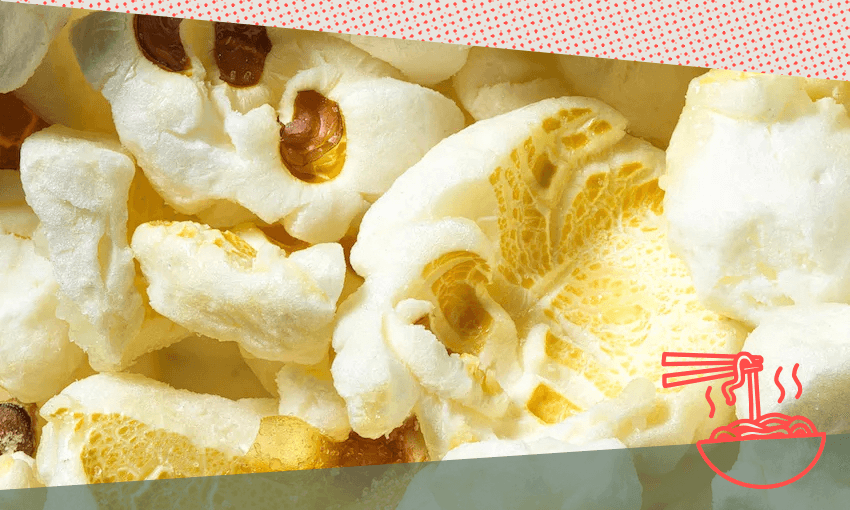Popcorn has one job. So what happens when it fails? Charlotte Muru-Lanning reports from the stovetop.
This is an excerpt from our weekly food newsletter, The Boil Up.
There’s nothing quite like the lively ceremony of making stovetop popcorn. First there’s the clattering of those amber-coloured kernels into the pot. Hopefully within minutes, there’s the first hollow pop. Then, between a few beats of suspense, another abrupt crackle, before a flurry of kernels transform by way of steam into crunchy puffs. All this is then festooned with salt, spices and seasonings, and as is inevitable with popcorn, quickly eaten without restraint.
When I consider the process through which these kernels become the delicious snack we eat, I can’t help but think about the concept of ihi: “the power of living things to develop and grow to their full maturity and state of excellence,” as Cleve Barlow described in his 1991 book Tikanga Whakaaro.
Perhaps this level of philosophising over popcorn hints at my currently obsessive relationship with it. Att any point in time before this year, I’d have categorised that relationship as more of a friendly ambivalence. Sure, I’d share a box of popcorn at the movies, but it wasn’t exactly essential, and you certainly wouldn’t find me shaking a pot of kernels on the stove at home. However, I’ve had two of what I would describe as “popcorn canon events” this year that have turned my relationship with the snack inside out.
One of these was my introduction to Bar Planet, a martini bar in Sydney where our drink order was accompanied by a paper bag of popcorn that was so wonderful we spent a good chunk of our evening speculating about what exactly the stuff was laced with. It was the first time I’d ever been really captured by popcorn and it was only this past week that I figured out Bar Planet’s recipe (thanks to TikTok).
The second event was a chance discovery of one of American chef Carla Lalli Music’s recipes for popcorn, or more specifically, her “Magical 7-Spice Umami Popcorn” (which I’ve spoken about excitedly in this newsletter before). That is to say, I am a changed woman. You will now find me regularly shaking a pot of kernels over the stove at home.
However, after months of successful popping, my recent attempts at making popcorn have been absolute failures. Bowls of eccentrically seasoned puffs have dissipated into a world of kernels that refuse to pop and blackened blobs of white at the bottom of the pot. It’s almost routine at this point for my flatmates to return to a house filled with the smell of burnt maize and inquire gently about the status of yet another failed popcorn attempt. Fossil evidence suggests that corn was popped as early as 4,700 BC in Peru and yet here I am, just a few months into my journey, unable to get a kernel to pop.
I turned to the internet which suggested two possible causes for this popcorn misfortune: incorrect cooking method or old/ bad kernels. I’d continued my previously fool-proof popping technique (including exactly the same pot and stove top) which had been cross referenced with those in online popcorn forums, so I let myself off the hook with that one. The variable that had changed, however, was my kernels. Because finding kernels at the supermarket can be spotty (unless you’re after the microwave kind), I’d turned to a rotating selection of bulk bin stores for my stash. I began buying small portions to use on the same day of purchase – and still had the same unfortunate outcome: the absence of movie snack material and the presence of failure.
Popcorn can last indefinitely when stored in a sealed bag or airtight container but without that, kernels can lose their ability to pop. I have a suspicion that the lack of consistent airtightness in these kinds of stores might be affecting the freshness of these kernels. Popcorn only has one real job (I mean, you can technically plant the kernels too but that’s another story), and so surely we have a problem when they don’t pop.
After probing me on my method, a spokesperson for Consumer NZ said the issue was pretty clear-cut. “If popcorn doesn’t pop it’s not really fit for purpose,” the spokesperson said. “And it can’t be repaired,” they added, citing the Consumer Guarantees Act. At around $1.60 a pop (or non-pop, rather) I’d absorbed the financial hit, chucked the burnt kernels in the bin and continued on with my day, but Consumer NZ recommends returning your dud popcorn and asking for a refund or replacement – if not for you, for the benefit of future customers. “Just because it’s cheap doesn’t mean the Consumer Guarantees Act isn’t valid,” they told me.
To make this story more confusing, after months of failure, I bought popcorn from a new bulk bin shop earlier this week. The outcome was astounding, if not rather frustrating for the story. The popcorn popped without a hitch using my regular method. I’ve come to accept that this inconsistency is part of the thrill of my infatuation with popcorn. Sure, if my popcorn-making record had been less unfortunate I’d have enjoyed a lot more bowls of the stuff by now, but would I know as much as I know now about the inner workings of these little yellow kernels? Absolutely not.
The Spinoff is looking to capture that broad and ever-evolving definition of kai in a new editorial project: What’s eating Aotearoa. If you’re keen to help fund food-focused journalism, make a pledge today.





